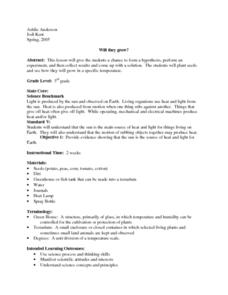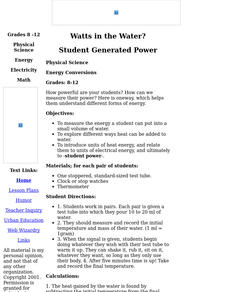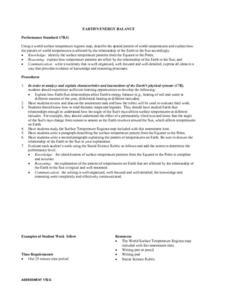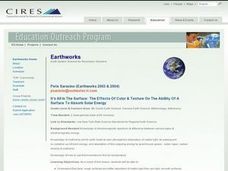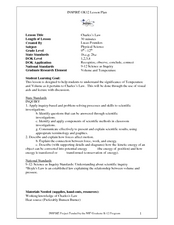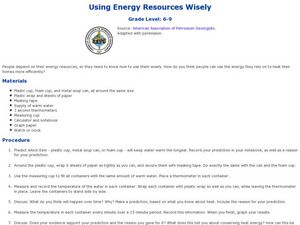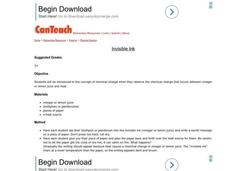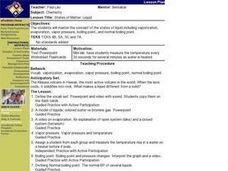Will Steger Foundation
The Carbon Cycle - What are its Implications for Climate Policy?
The carbon cycle isn't a bike which produces carbon and this instructional activity explains why. Through reading and discussion, groups of pupils create visual explanations of the four parts of the carbon dioxide oxygen cycle....
Curated OER
Will they grow?
Third graders plant seeds and see how they will grow in a specific temperature and are questioned about different environments and how they think crops would grow there. They form a hypothesis, perform an experiment, and then collect...
Curated OER
Water Speedway
Fourth graders observe changes in matter caused by the addition of heat. They participate in a physical education activity where they deal with science concepts. They have a knowledge of how particles act in water when heated.
Curated OER
Earth's Energy Balance Performance Standard
Students examine how Earth-Sun relationships affect Earth's energy balance and the pattern of world temperatures. Students study a Surface Temperature Regions map and write a paragraph describing the temperature pattern from the Equator...
Curated OER
Weather Instrument Use and Application
Eighth graders measure temperature, wind speed and pressure using Skymaster SM-28. In this earth science lesson, 8th graders collect data and record observations taken from outdoors. They explain why numerical values are different in...
Curated OER
It's All In The Surface: The Effects Of Color & Texture On The Ability Of A Surface To Absorb Solar Energy
Ninth graders examine how dark surfaces absorb more light than light surfaces. They perform an experiment that compares various surfaces abilities to absorb heat, then record and analyze the results.
Curated OER
Combustion
In this combustion pre-lab worksheet, students determine the chemical equation for the reaction, define combustion and exothermic, and describe the molar heat of combustion. This worksheet has 14 short answer questions.
Curated OER
Discovering Albedo
Learners read a thermometer accurately, collect and record data, and generate a graph based on data. They learn what independent and dependent variables are. They analyze data and make conclusions concerning how soil coverings affect...
Curated OER
Energy Transfer
Students investigate the properties of heated air. They make predictions about what they think makes the wind blow on a worksheet, and conduct two experiments to demonstrate the properties of heated air. Students heat a bottle until a...
Curated OER
Causal Patterns in Air Pressure Phenomena
Students consider the relationship between pressure and temperature. They observe a demonstration and explore the relationship between heat and volume when pressure remains constant. Students discuss relational causality and consider...
Curated OER
Air Masses
Students examine the physical characteristics of several types of air masses to discover how air masses can be identified and defined by their temperature and moisture content.
Curated OER
Melting and Freezing of Water
Students differentiate the three states of matter. In this chemistry lesson, students analyze graphs of heating and cooling curve of water. They complete a lab report and discuss results.
Curated OER
Coal Moisture Analysis
Students investigate coal samples and analyze its drying loss under controlled conditions. They establish the loss in mass of a sample when heated under controlled conditions of temperature.
Curated OER
Biomes: Extreme Climate
Students discuss the causes of global warming. In this earth science instructional activity, students examine how global warming is connected to the arctic and world climate. They write a paragraph about their interconnection.
Curated OER
Charles’s Law
High schoolers describe the relationship between temperature and volume. In this chemistry lesson, students perform an experiment and record their their results. They use Charles' law to explain their observations.
Curated OER
Current Interactions
Students design an experiment to see how wind, temperature, and salinity work together to influence ocean currents and present it in a report format. They explain to their classmates how experiment findings relate to ocean currents.
Curated OER
Energy in the Form of Calories
Students calculate the amount of food calories found in an individual peanut. In small groups, they set up the experiment so that a burning peanut will heat water above it. Using the temperature change and volume of the water they...
Curated OER
Using Energy Resources Wisely
Students discuss energy resources. In this energy lesson, students predict which item: the plastic cup, metal soup can, or foam cup, will keep water warm for the longest time by measuring the temperature in each item every minute for 15...
Curated OER
Your Own Greenhouse
Young scholars discuss the similarities between the Earth's atmosphere and a greenhouse. In this science lesson, students make their own greenhouses out of plastic bottles and thermometers. Young scholars record the temperature different...
Curated OER
Invisible Ink
Pupils are introduced to the concept of chemical change when they observe the chemical change that occurs between vinegar or lemon juice and heat.
Curated OER
Geography of the Wasatch Front
Learners examine and discuss urban geography and land-cover types along the Wasatch Front. They analyze thermal images, create collages, and predict surface and air temperatures from aerial photos in the Salt Lake City Valley.
Curated OER
Smog Be Gone
Students begin the lesson by identifying greenhouse gases. In groups, they observe and record the effect of the gases on the atmosphere and the temperature of the Earth. They participate in activities that describe the role of...
Curated OER
States of Matter: Liquid
Learners work in a mini lab where they measure the temperature every 30 seconds for several minutes as water is heated. They are asked what makes liquid different from a solid. Students view a PowerPoint on the model of liquids,...



